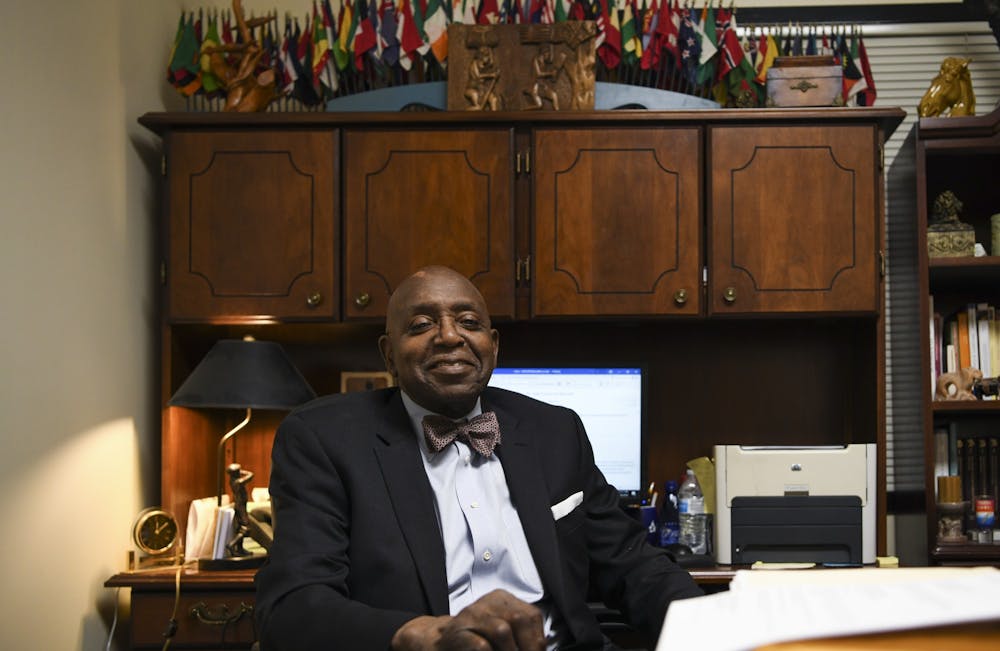When taking a course with the university's first African American full professor, who is still teaching at the university today, students encounter what is known as "the McFadden experience."
Johnnie McFadden was hired as a full professor in 1979 and currently teaches in the department of neuropsychiatry and behavioral sciences at USC's School of Medicine.

"He's genuinely interested in making a genuine human connection with you," Michael Walsh, a clinical assistant professor who co-teaches a class with McFadden, said. "'The McFadden experience' is what the students talk about ... It's genuinely something that sticks with students many, many years after they experience it."
McFadden's 62-year career began in 1958 in Statesville, North Carolina. He was a public educator for two years before working as a junior high teacher in Wilmington, North Carolina, for six years.
From 1966 to 1970, while schools were being desegregated, he taught for the Charlotte-Mecklenburg school district.
"All-white students, all-white faculty, all-white administrators, all-white parents," McFadden said. "But they were a desegregated school ... and they wanted me to be a part of that because they'd heard about my record in Wilmington."
Associate dean for diversity, interdisciplinary programs and social sciences Tracey Weldon has known McFadden and his family since she was a child.
"They've always been mentors of mine," Weldon said. "It was, you know, an opportunity for me to actually see what a professor looks like and to know that there are African Americans who do that work. In many ways, I've followed in his footsteps."
McFadden was named the North Carolina Teacher of the Year in 1970. When he was in the running for National Teacher of the Year that same year, he was named the first runner-up.
McFadden came to USC to pursue a program that allowed staff to get doctorates in different fields. Through the South Carolina School Desegregation Center's program, he became a staff member and a doctoral student at the same time.
After completing his doctor of philosophy, he was hired as an assistant professor in 1973. Despite the divided racial climate, McFadden said USC's atmosphere was generally tolerant.
"There was an atmosphere of acceptance, but selectively so," McFadden said. "The reason why I say that is because the people that I worked with were friends of mine who came down here from Chapel Hill, and we all knew each other. So, that situation, black-white relationship, was one which was easy to merge because we were all aiming toward a better society."
In 1988, McFadden became USC's first African American to have an endowed chair, the Benjamin Elijah Mays Professor. He also founded the Benjamin Elijah Mays Academy for Leadership Development, which was designed to help high school students develop leadership skills in a number of interdisciplinary areas. In 2006, he became the Benjamin Elijah Mays Distinguished Professor Emeritus.
McFadden has served in a number of administrative positions at USC and has written more than 160 professional publications. His most famous philosophy, stylistic counseling, is still used today.
"In terms of being a trailblazer, I never really thought about that," McFadden said. "I try not to look at it that way because I guess I'm a little more reserved when it comes to describing myself."
McFadden is the director of the Grace Jordan McFadden Professors Program, which he named after his late wife. The program is designed to address the under-representation of minority professors on university campuses.
As a homage to his wife, McFadden composed a poetry volume that is more than 10,000 pages long. Weldon said his "love and admiration" for her is "unparalleled."
"He continues to keep her memory alive in ways that are really heartwarming," Weldon said. "I don't think I've ever seen him at a public event where he didn't mention her name."
Walsh said he believes the university is fortunate to still have McFadden.
"He's just such a nice, unassuming guy that he often goes unnoticed," Walsh said. "We've got one of the richest resources in the world right here on our own campus."
Editor's Note: This article has been updated to reflect that McFadden was the first African American full professor at USC.

